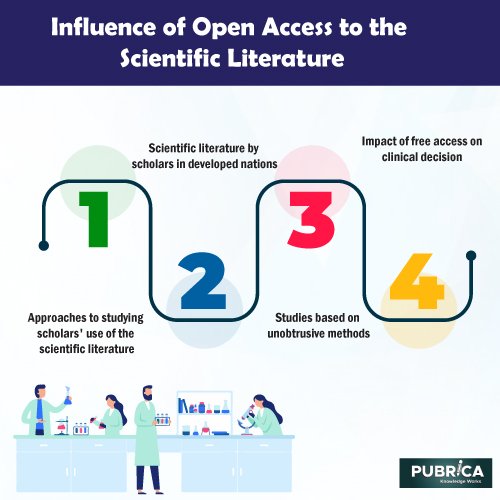
Reporting guidelines – Manuscript Writing in Medical Research
January 21, 2022
Grant writing for creative medical research: Time to reconsider
January 25, 2022In brief
The study examines recent research on the influence of free access (open access) on the behaviour of scientists in advanced and developing countries as writers, readers, and citers. It also looks at how widely the general people utilise the biomedical literature. Access to scientific publications is typically excellent and improving, according to researchers. When it comes to determining where to publish, the open access status of a journal is not a significant factor. There is strong evidence that open access increases paper downloads, while the influence on article citations is unclear. According to recent studies, considerable citation advantages are just byproducts of failing to account for confounding variables effectively. The impact of open access on the general population’s practice of primary medical literature has not been adequately assessed.
Introduction
The perception that the subscription-based publishing model has resulted in a crisis of access to scientific publications [1] is a powerful argument favouring open access publishing. This research examines that assertion by analysing the current literature and demonstrating how open access has impacted scholars, physicians, and the general public in developed and developing countries.
The influence is measured in reading, citation, and other types of use. It does not assess how technically accessible, indexed, catalogued, or available for future use the publicly available scientific material is. The topic is limited to scholarly literature, and therefore studies of online newspapers, periodicals, and trade media are not included. It also focuses on natural sciences, as most free access research has focused on biomedical, physical, and computer sciences. Although “open access” is the often-used word for scientific work that is freely available online, the phrase “free access” is chosen here since “open access” is typically interpreted to encompass concerns such as copyright, archiving, funding, and social justice that are not addressed in this paper.

Methods
The study is based on a review of existing empirical research that attempts to quantify — directly or indirectly — academics, physicians, and the general public’s access to and use of scientific material. Bibliographic databases, referenced references, personal interaction, and prior knowledge of the issue were all used to find relevant books. Papers on the economics of scientific publication, for example, are omitted from studies of how information is created, published, and made publicly available.
Approaches to studying scholars’ use of the scientific literature
Each strategy has advantages and disadvantages. To derive conclusions about a given community, surveys can elicit the replies of thousands of people. While in-depth interviews have limited generalizability, they may be used to go further into a topic and study the values and motives of interviewees.
Authorship and use of the scientific literature by scholars in developed nations
Periodic examinations of scientists’ information-seeking and reading habits in the United States have identified three tendencies over the last thirty years: (1) Scientists are reading more articles while spending less time searching for and retrieving them; (2) scientists are reading from a broader range of journals and extending their reading into older literature; and (3) scientists have become more reliant on institutional (library) access to journal collections, though they still use informal sources like preprint servers and colleagues.
Studies based on unobtrusive methods
Downloads
Data obtained from Elsevier and Oxford University Press’s online transaction logs reveals two critical trends over the last few years: an increase in the number of journals accessible at a typical university and an even more significant growth in the number of article downloads [2]. These figures are used as evidence by package deal publishers that they add value to the academic community.
Citations
The influence of online and open access on citation behaviour among academics is unclear. The extent to which improved access has extended the scope of referenced material is a point of contention.
Impact of free access on clinical decision making
Participants in the study were given one of four access options: (1) no mention of the relevant article, (2) a citation to the article without a hyperlink, (3) a citation with a link to the article (which costs $11.95), or (4) a citation with a link to a free copy of the article. After a week, participants were asked to read a vignette regarding the article’s topic and provide recommendations for medical intervention. Participants in group 4 were the most likely to say they had read the article in both experiments. Only one research found that reading the article made a recommendation based on the information it provided. These findings suggest that having free access to research publications enhances the chance of downloading and reading them.
Summary and discussion
While free access encourages more people to read, the influence on citations is still being studied. According to current studies, there is little indication of unmet demand for primary medical or health sciences books among the general audience. There have been no revisions that look at how open access to scientific publications affects the usage of scientific knowledge in non-research settings, including teaching, medical practice, industry, and government.
About Pubrica
Pubrica’s researchers and authors create scientific and medical research articles that practitioners and authors may use as reference materials. By presenting the reader to the deficiencies or gaps in the selected study field, Pubrica medical writers assist you in writing and editing the introduction. Our professionals are familiar with the framework that follows the broad topic, problem, and background to a small case where the hypothesis is stated.
References
- Open Access Now. (Mis)leading open access myths [Internet] BioMed Central [cited 29 Nov 2010] < http://www.biomedcentral.com/openaccess>.
- Research Information Network. E-journals: their use, value and impact [Internet] The Network; 2009 [cited 28 Mar 2011]. http://www.rin.ac.uk/files/E-journals_use_value_impact_Report_April2009
- Davis PM, Walters WH. The impact of free access to the scientific literature: a review of recent research. J Med Libr Assoc. 2011;99(3):208-217. doi:10.3163/1536-5050.99.3.008
